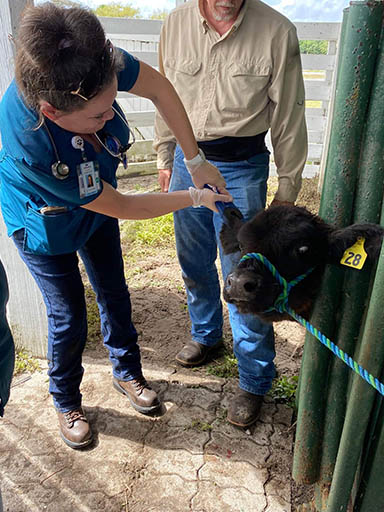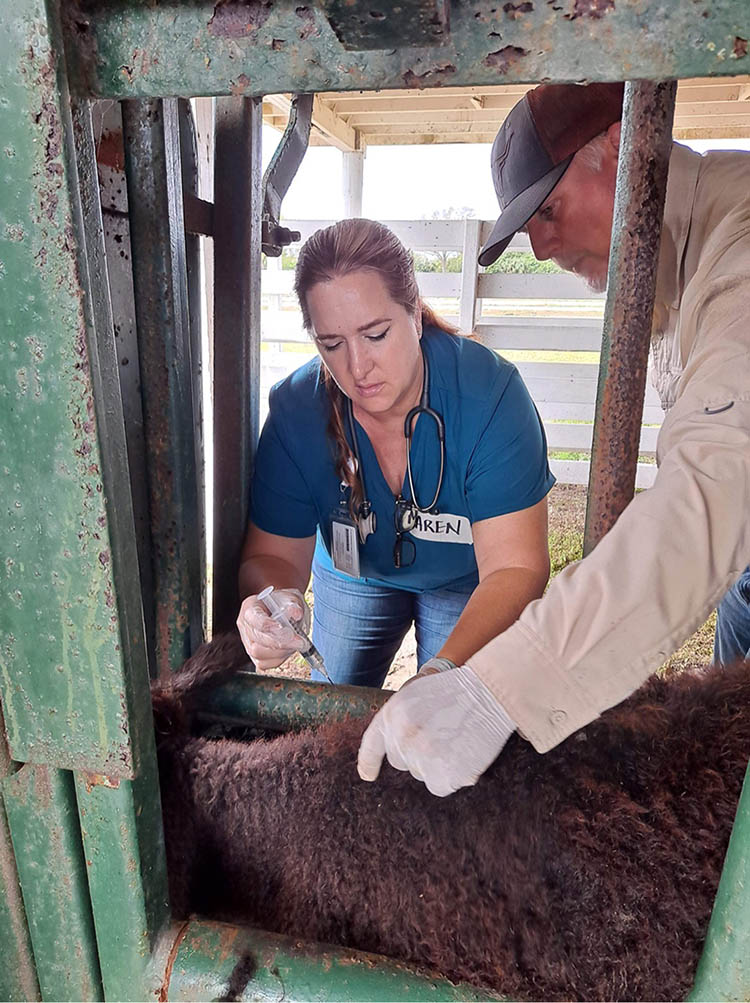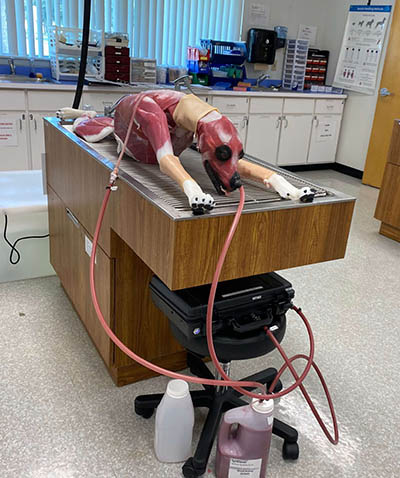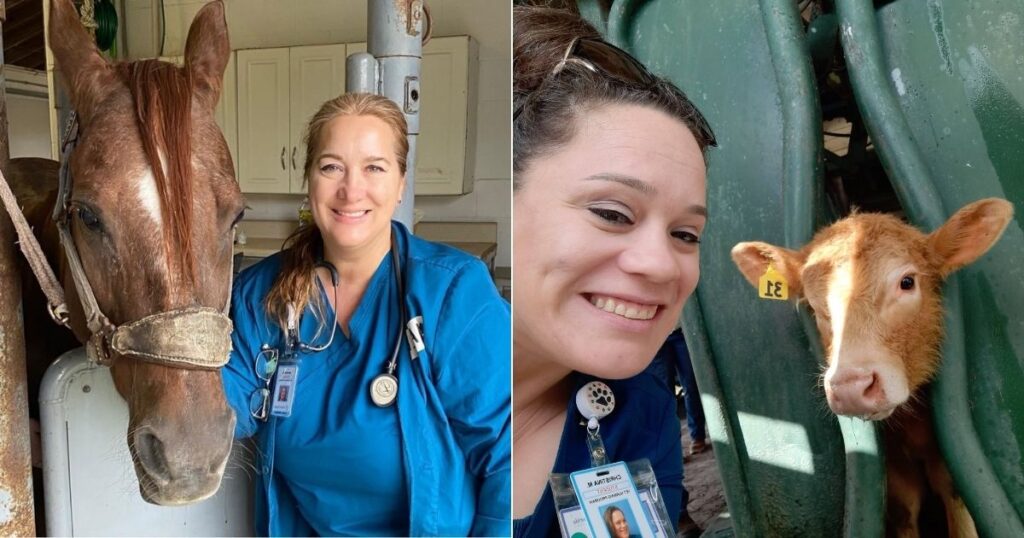Do have a heart for helping animals? Are you fascinated by science and medicine? Would others describe you as curious, hands-on, and detail-oriented? EFSC’s Veterinary Technology A.S. degree could be the perfect fit for a student like you!
Maren McAvoy and Christina Miller, who have both completed three semesters of the Veterinary Nursing program, provide a behind-the-scenes look at this exciting degree path, its immersive laboratory experiences, and advice for future students who decide to pursue this rewarding career.
How Did You Get Interested in This Field, and Where Are You Currently in Your Program?
Maren: I had always wanted to be a veterinarian when I was younger, and I’m a different kind of vet. I was in the military for 31 years. After I retired, I was like, “You know what? I’m going to do what I always wanted to do!” That’s why I picked Veterinary Nursing. I have a piece of paper in one of my notebooks that says, “I want to be the best vet that ever lived!” from when I was eight years old that I carry for motivation. So, it’s just been a lifelong dream. We’re just finishing up our first year of Vet Nursing. We both happened to start in the Veterinary Assisting program, and then we applied into Veterinary Nursing. We both have three semesters under our belt.
Christina: I didn’t know what I wanted to do when I grew up. As a married mom, I was like, “I want to do something. I would love to work with animals.” What kind of animals? I don’t know yet. But I’m hoping with the rest of the time in the program, I’ll have that figured out.
What Are Your Main Responsibilities as a Vet Nurse? What Are You Learning in Class?
Maren: It’s so much more than a regular human nurse because we have to learn a lot more jobs. Nurses don’t, for example, look at blood smears. They send it to somebody else. We have to learn all those skills. Plus, we have to do it for many species of animals — 100 different species, from a little rat to a horse.
Christina: We’re an anesthesiologist, radiologist, pathologist, technician, phlebotomist….
Maren: We do everything except diagnose. We don’t diagnose or do surgeries or prescribe medicine.
What’s It Like in the Classroom? What Would You Say a Typical Day and Week Are Like?

Christina: We’re here four days a week. It’s very fast-paced. It’s a lot of information. We can’t wait to put it into practice. This summer we’ll have our second clinical experience, where we’ll be able to do a lot of what we’re learning.
Maren: We’ve been in this classroom since 8:45 AM today.
Christina: Today we learned about bone marrow. How to gather or get bone marrow from a patient, because that’s something we’ll be doing. We had three hours of lecture today. Physiology was this morning.
Maren: We’re usually up in the laboratory doing blood, urine, or fecal tests. Today, we all had to give a presentation. We’re getting ready for the final, so we’re teaching each other a specific disease or a specific skill.
What Kinds of Animals Have You Worked with So Far?
Christina: We’re working on a large animal lab right now. We just worked on cattle. We’ve done horses, and then worked with dogs and cats in clinic.
Maren: We also did rats and mice in laboratory animals. So really, from the smallest little creature of a mouse up to a full-grown horse. This semester we’ve handled both of those. We go out of the classroom for the horses and cows. We went out to the University of Central Florida facility for the mice and rats. We’re going to do goats and sheep; they’re coming over to Building 21 in a couple of weeks.
Do You Know What Type of Specialization You Personally Want at This Stage? Has Being Hands-On Helped You Decide What You Enjoy Versus What You Don’t Enjoy as Much?
Christina: I love homeopathy. There’s a lot of natural medicine that’s starting to come around in the veterinary field, so I find that very interesting. Either that or cattle. Large animals. I’m a Texas girl, so having grown up around that, it fascinates me. But Maren’s the opposite.
Maren: I think we both don’t really want to work with cats and dogs. We don’t want to be traditional in that aspect. I’m more drawn to exotics in the zoo. I volunteer at the Brevard Zoo right now, so that’s where I’m headed in my mind. Working over in Orlando at Animal Kingdom would be a dream. We get so much variety, we’re both trying to figure out what our best fit is.
What Do You Like Most About the Work That You’re Doing and the Experiences That You’re Having?
Christina: The camaraderie between the students.
Maren: I have friends for life now that I didn’t have a year ago. So that’s super fun.
Christina: And we always help each other out. If we have questions, we’re there for each other. The instructors are awesome. They’re willing to help you as needed.
What Is the Balance Between Textbook Learning and Hands-On Learning in the Classroom?
Christina: I would say 50/50. As we get even further into the program, there’s going to be a lot more hands-on because when we study diseases, we’re going to see it.
Maren: Even that first semester, we went right into “Introduction to Exam Rooms.” We were doing exams on cats and dogs while learning basic things like temperatures and heart rates. You must have a little bit of knowledge ahead of time before you put your hands on the animals. Every semester we’ve had a lab, and we’ve had our hands on an animal every semester.
Name 3 Skills, Abilities, or Personal Attributes You Think Are Necessary If You Want To Go Into This Program or Field.
Maren: You have to be confident. I see a lot of younger students come into the program. When you talk to the classroom, you have to be confident, because someday you’ll need to be confident to a veterinarian when they’re asking you questions about your work with an animal. You can’t be shy.
Christina: You don’t have to be a people person, but be able to handle people well. That’s key. In the clinics you’re not just dealing with animals. It’s the owners as well.
Maren: I think you really have to have your mental acuity together. We’re learning some hard stuff. We had to take an entrance test called the TEAS to get into this program. It assesses your ability to get through the program.
If You Could Go Back and Tell Your Past Self One Piece of Advice Before You Entered the Program, What Advice Would You Give?
Maren: Take math, chemistry, and biology.
Christina: You need chemistry to do medications, for example. You have to know how things are going to be affected, the processes of diseases, and so on.
Maren: Get those together before you come into this program, and you’ll be ahead. It’s fun math. It’s not finding the hypotenuse of a triangle. It’s working with things like equations for blood cells to determine anemia. This kind of math shows what the animal is diagnosed with.
Christina: It’s common-sense math — dividing, multiplying, and making sure that your decimal points are right. It’s not trigonometry.
What Would You Say Are the Job Prospects in This Field?

Maren: The teachers are getting constant requests for Vet Nursing students. I guarantee when we both graduate next spring and have this degree, we can start working somewhere.
I follow the job postings in Brevard County, and they’re constantly asking for veterinary technicians. We also have four different courses in on-site work experience, where we’re put out into the field. A lot of students get hired through that process.
Christina: The work experiences are awesome. You put your hands on the animals. You get to do procedures that you learn your first semester, plus more; for example, placing tracheal tubes, drawing blood, starting catheters, and sitting in and watching surgeries being performed.
You’re not just getting to do what you’ve learned so far, but you’re also seeing into the future of what you’re going to be doing.
What’s One Piece of Advice You Would Give a Student Interested in Going Into This Program?
Maren: Go online and see what the prerequisites are. You’ll also have to go observe a veterinarian as part of the application. It helps you decide, “Do I really want to do this?”
Start at least a semester ahead of time looking at what is needed for the application — if not a year ahead of time.
Christina: Start getting your study habits in during those prerequisites. You must have good study habits and know how to study efficiently.
Maren: Buddy up with an experienced person when you get into the program. Don’t be afraid to socialize with people outside of your normal age group.
Do You Have Any Closing Thoughts About the Vet Nursing Program?

Maren: If you want to be full-time, plan ahead, save your money, and consider whether you’ll be able to work while you’re completing the program.
The labs are fun. We have a full working clinic that we get to take part in over at Building 21. When you walk in, you think it’s a vet clinic with a reception desk and everything. It’s very realistic.
We even have a synthetic cadaver of a dog. It pumps artificial blood, so we can use it for jugular draws, for example.
The staff is amazing. The teachers, the program staff, everyone is just top-notch.
Christina: It’s a fun program. It really is a fun program.
Wondering If a Career in Veterinary Nursing Is Right for You?
Begin by visiting the Veterinary Nursing degree program page to learn more about its selection criteria and application process. Then, be sure to speak with a Career Center Coordinator to determine whether this is the right career path for you, to discover similar careers, and to take the next step in your professional development. We look forward to working with you!




